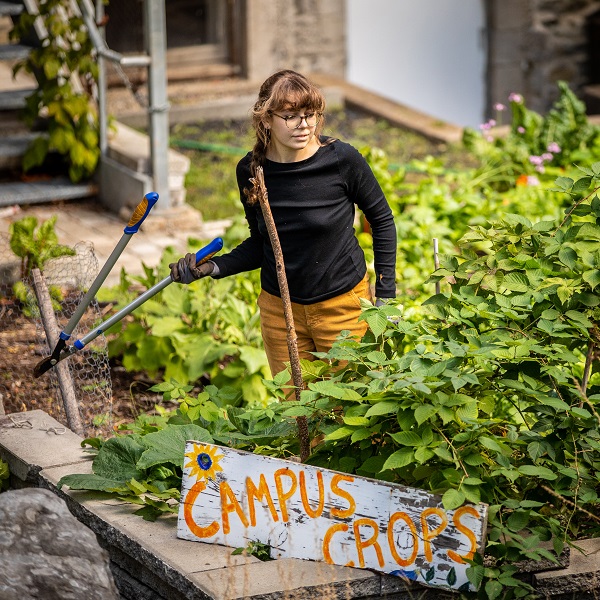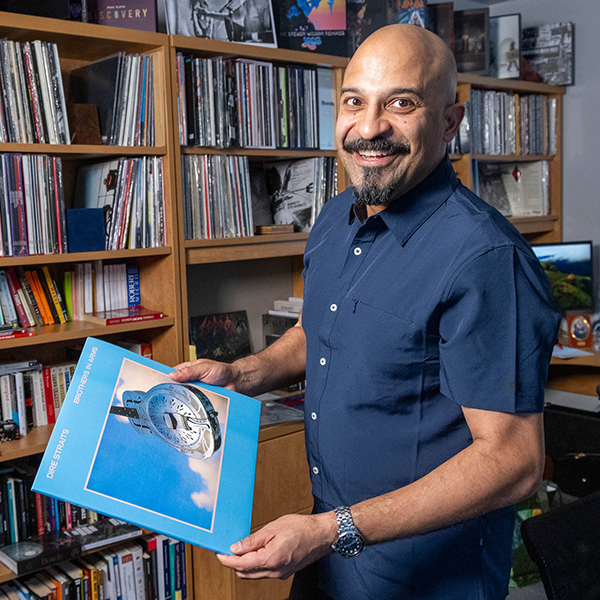Is sustainability a factor when you’re thinking about the nutritional needs of hospital patients? It is if you want to focus on providing nutritious food that patients will actually want to eat while cutting down on waste.
Mary Hendrickson is a faculty lecturer and the dietetics stage clinical coordinator for McGill’s School of Human Nutrition. When her students in Professional Practice Stage 2B prepare for a summer stage at the McGill University Health Centre, they take an OSCE – an Objective Structured Clinical Examination – at McGill’s Steinberg Centre for Simulation and Interactive Learning to prepare for situations they might face in the hospital itself.
Their course and the OSCE include group discussions on sustainability in health care.
“Given that balancing nutrient intake and food waste in healthcare institutions is vital to reducing the risk of patient malnutrition and healthcare costs while improving patient outcomes, educating ‘stage’ students on concepts of sustainability was of great importance,” wrote Hendrickson and former graduate student Sarah Staples, MSc(A)’24, on a blog hosted by McGill’s Teaching and Learning Services.
Hendrickson and Staples were part of the first cohort to participate in McGill’s Sustainability Education Fellows (SEF) program. The program supports faculty members at McGill as they design new or redesign current courses to incorporate sustainability issues and perspectives.
The courses that have been developed or reshaped through the SEF program run the gamut from Elementary School Science Teaching Methods, to Sustainable Design of Concrete Structures, to a Sustainability in Medicine course that explores climate-related health issues.
The SEF program was launched in 2022 as part of the University’s Climate & Sustainability Strategy 2020-2025 (which was just updated for 2025-2030) with the support of the Sustainability Projects Fund, which builds a culture of sustainability on McGill campuses. Subsequent support for the program has come from the Entente Canada-Québec fund.
“They would like their teaching to center more on these issues – but it can be hard, if you’re not studying climate science, to figure out how to fit it in.”
Associate Professor of Education Blane Harvey
The strategy asserts that McGill “strive[s] to be a leader in teaching, learning and research, creating and communicating the knowledge required for humanity to live sustainably at the local, regional and global levels.” Following this objective, the SEF program supports faculty members as they design new or redesign current courses to incorporate sustainability issues and perspectives.
“Research shows that, in Canada and elsewhere, students and faculty members would like to be more engaged with sustainability and climate change,” says Associate Professor of Education and William Dawson Scholar Blane Harvey, MA’02, PhD’10, who serves as program advisor for the initiative.
“They would like their teaching to center more on these issues – but it can be hard, if you’re not studying climate science, to figure out how to fit it in.”
That’s where sustainability education comes in. Professors, joined by graduate student fellows, take approximately 10 workshops over the year, working together to share and refine ideas about how they can incorporate sustainability into their courses.
The program came about as a conflation of parallel efforts. Harvey and Stephanie Leite, a doctoral candidate in the Faculty of Education whose research focuses on transformative approaches to climate change education, had been teaching informal workshops on sustainability education in their Faculty, while Jessica Latus, a sustainability officer in the McGill Office of Sustainability, had also been developing a workshop idea.
They joined forces to propose the SEF, which has now assisted 21 faculty members, each collaborating with a graduate student on the new or revised courses. April 2025 saw the launch of the third iteration of the program, with 11 professors and 13 graduate students taking part.
Program funding supports the student fellows who assist the professor in redesigning established courses or creating new ones. The student participation is especially beneficial, notes Harvey, as they bring fresh perspectives. It wasn’t so long ago that they were undergraduates themselves, so they have their own ideas about what might work (or not) in a class.
“Each workshop has a clear focus and purpose, focusing on some element of course design,” says Leite. One workshop might concentrate on evaluation, for instance.
Recruiting a truly interdisciplinary cohort is a program priority. “We want to invite people from outside the sciences to see that this could be their work also,” says Leite. “We don’t want more than two people from any one department in each cohort because we want to keep an interdisciplinary conversation happening.”
The approach is garnering positive reviews. “People tell us they really value the interdisciplinary aspect,” says Latus. “Teachers from different disciplines, different worlds, are talking together and we get feedback about how enriching those conversations are.”
Course design for sustainability is like an iceberg, says Leite, in which the actual content is only the tip. “It’s not hard to do a Google Scholar search and find content related to sustainability in these different disciplines. But what happens when you go below the surface to think not only about content but how you are teaching and evaluating your students and what world views might be replicated, consciously or unconsciously?,” she asks.
“We design these workshops to raise questions about the perspective you bring into the space as an instructor or how ‘sustainability’ is interpreted from the perspective of your discipline.” So, the SEF has had teachers from the Faculty of Medicine and Health Sciences, the Department of Bioengineering, the Schulich School of Music, and the Desautels Faculty of Management working together as they explore how sustainability fits into their teaching.
“These different perspectives help individual instructors broaden their understanding of what sustainability is and how they can incorporate it into their classrooms,” says Leite.
Cristina Carnemolla, an assistant professor of Hispanic and Italian studies, says those conversations with peers from other disciplines are valuable. She and student fellow Daniel Salas Hoyos worked on the course Gender and Textualities as part of the second cohort of the SEF program. The class uses 19th and 20th-century magazines, recipe books and other materials to examine how certain notions about gender became dominant while other ideas were marginalized.
“It’s an exercise in translating our knowledge to a broader audience,” Carnemolla says of the interactions with faculty from other parts of the University. “When I spoke about taking an intersectional approach in my course, I had to translate to them what that means. And this is something that we should also do when we write syllabi for our students.”
Sustainability and climate change have been the subject of extensive research, especially in the sciences, but despite all this information and knowledge, behavior change is slow.
“That’s really what we’re trying to get at: we want people to care about this and to change behaviors,” says Leite. “We want our students to become passionate, not just about the content, but about the issues and the impact of the work they do.”


